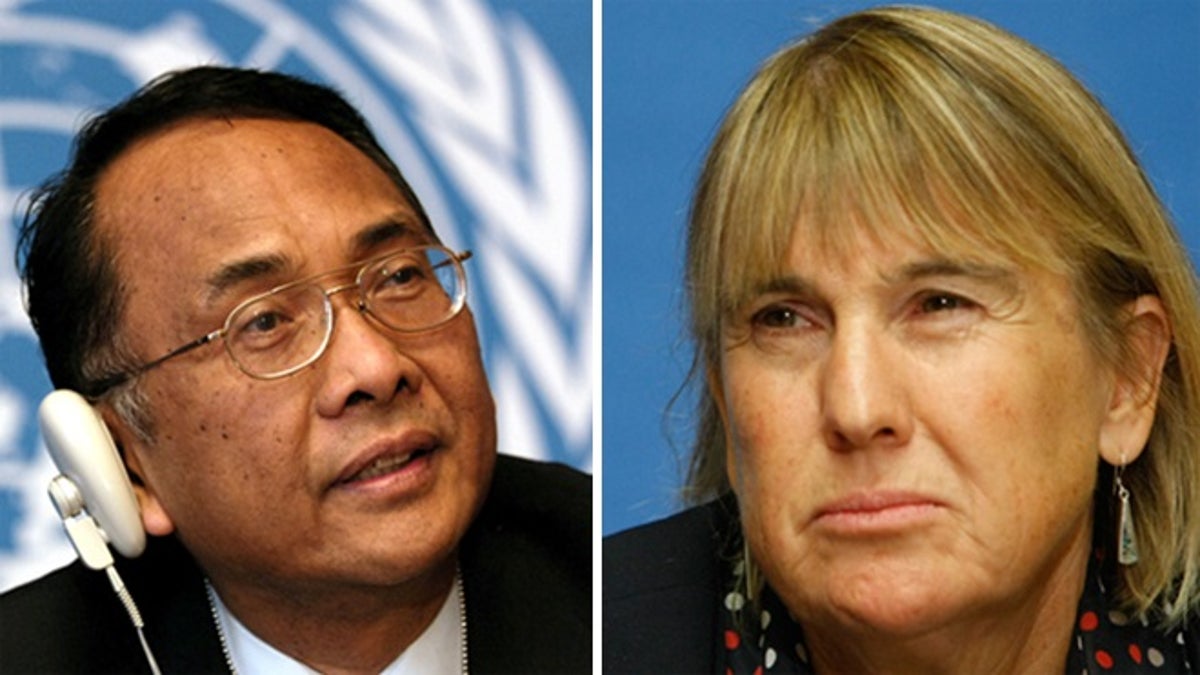
Makarim Wibisono of Indonesia (l.) and Christine Chinkin, a professor at the London School of Economics, both have a history of anti-Semitic statements. (Reuters)
Under pressure from Arab nations, the United Nations Human Rights Council has rejected a U.S.-backed choice to replace its outgoing point man on Palestine, and is now eyeing two candidates who share a long history of alleged anti-Israel bias.
The current front-runner to replace Richard Falk, a 9/11 truther who once praised Ayatollah Khomeinei and was reliably anti-Israel while serving as the council's special rapporteur on Palestinian rights, is Christine Chinkin, a law professor at the London School of Economics. Chinkin authored the Goldstone report, an infamous UN study on the Gaza conflict that was repudiated by Israel. A dark horse candidate is Indonesia’s former UN envoy, Makarim Wibisono, who has long been an outspoken critic who has a history of making one-sided remarks on the Israeli-Palestinian conflict.
Either choice will ensure the 47-member council employs a monitor with a built-in, anti-Israel bias, said UN Watch Executive Director Hillel Neuer.
"The real issue is not the nominees, but the biased position itself," Neuer said. "This is the only council mandate that requires the examination not of a given region, but of only one side, with the specific instruction to investigate 'Israel's violations of international law' in the territories, while completely disregarding human rights abuses against women, Christians and dissidents that are being committed by Hamas, Fatah, Islamic Jihad or others."
Georgetown Law Prof. Christina Cerna, who the U.S. backed for the job, was rejected after several Arab nations balked. Neuer said they sent letters to UNHRC President Remigiusz Henczel objecting to her candidacy. Critics of Cerna -- who received a unanimous recommendation from the council’s five-member vetting panel -- said she had not been on record in the past with any statements on Palestinian issues.
The impartiality of Chinkin, who has accused Israel of war crimes, was questioned by foreign policy academics as well as then-Human Rights Committee Chair Sir Nigel Rodley.
The panel also is believed to be considering Wibisono, who has long been an outspoken critic who has a history of making one-sided remarks on the Israeli-Palestinian conflict. Neuer's group said Wibisono should be excluded from consideration because of a 2010 trip to Gaza, where he allegedly met with the leader of Hamas, and several past statements. Wibisono has accused Israel of “unconscionable use of force against the Palestinians,” "untenable acts of aggression," and of having a "policy of retribution against the entire Palestinian nation. In addition, he has often and openly supported what he calls the “sacred Palestinian cause.”
Appointments of all special rapporteurs have been postponed another month. Falk, an 83-year-old Princeton University professor, is set to leave May 1. Falk has accused Israel of of “slouching toward nothing less than a Palestinian Holocaust.” Last month, U.S. Ambassador to the UN Samantha Power left no doubt about how the White House feels about Falk.
"The United States welcomes Mr. Falk's departure, which is long overdue," Power said in a statement. "Falk's relentless anti-Israeli bias, his noxious and outrageous perpetuation of 9/11 conspiracy theories [and] his publication of bizarre and insulting material has tarnished the U.N.'s reputation and undermined the effectiveness of the Human Rights Council.”
